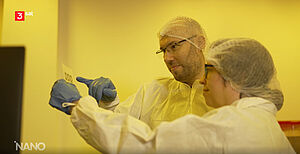In the 2 June 2025 issue of 3sat’s Nano magazine, two projects from the AIT Center for Health and Bioresources were featured: on the one hand, peptides derived from animal venoms that act as a “Trojan horse” to shuttle drugs across the blood–brain barrier; on the other, printed biochip sensors that detect tumour DNA mutations directly from blood samples within a few hours.
The first segment, from minute 15:25, shows how the AIT team aims to improve long waiting times and invasive procedures in cancer diagnostics: biopsies, complex sample logistics and laboratory workflows often delay the start of therapy by weeks. In the “NanoPredict” project, the AIT’s Molecular Diagnostics Group, led by project manager Eva Melnik in cooperation with MedUni Vienna, has developed an electrochemical biochip. After brief DNA amplification from a simple blood sample, the sensor recognises point mutations within a few hours – a tremendous advance compared to previous methods.
This is followed, from minute 19:25, by the report on the blood–brain barrier, a highly selective defence system that allows only two per cent of all active substances to pass and thus blocks many neurotherapies. Researchers from the AIT Molecular Diagnostics Team, under the leadership of Principal Scientist Winfried Neuhaus, are collaborating with the University of Vienna to develop peptides from snake, spider and scorpion venoms that bind specifically to transporter proteins of the barrier. In their in vitro models, they are able to use these peptides as vehicles and thereby effectively overcome the barrier.
If the peptide delivery vehicles prove to be safe and efficient in follow-up studies, they could become the platform for novel neurotherapeutics. At the same time, the decentralised application of the biochip sensors promises rapid, patient-centred cancer diagnostics – directly in medical practices or mobile health centres. In this way, AIT is paving the way for more precise, time-saving and less invasive procedures in therapy and diagnosis.
Programme available until 02.07.2026: https://www.3sat.de/wissen/nano/250602-sendung-ukraine-frauen-minenraeumung-landminen-krieg-sicherheit-ausbildung-lebensgefahr-minen-nano-100.html



